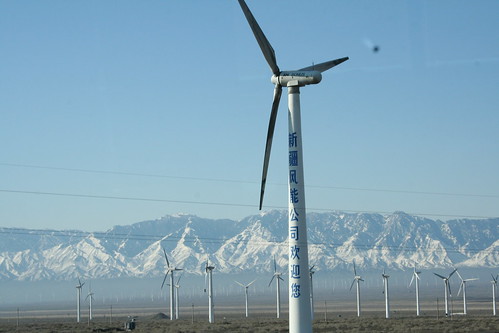China Could Meet Its Entire Future Energy Needs By Wind Alone
Posted by Big Gav in china, wind power
Science Daily has a report on a Chinese study showing the country has sufficient potential for wind power to meet the country's entire projected electricity demand in 2030 - China Could Meet Its Entire Future Energy Needs By Wind Alone.
A team of environmental scientists from Harvard and Tsinghua University demonstrated the enormous potential for wind-generated electricity in China. Using extensive metrological data and incorporating the Chinese government's energy bidding and financial restrictions for delivering wind power, the researchers estimate that wind alone has the potential to meet the country's electricity demands projected for 2030. ...
China has become second only to the U.S. in its national power generating capacity— 792.5 gigawatts per year with an expected future 10 percent annual increase—and is now the world's largest CO2 emitter. Thus, added McElroy, "the real question for the globe is: What alternatives does China have?"
While wind-generated energy accounts for only 0.4 percent of China's total current electricity supply, the country is rapidly becoming the world's fastest growing market for wind power, trailing only the U.S., Germany, and Spain in terms of installed capacities of existing wind farms.
Development of renewable energy in China, especially wind, received an important boost with passage of the Renewable Energy Law in 2005; the law provides favorable tax status for alternative energy investments. The Chinese government also established a concession bidding process to guarantee a reasonable return for large wind projects. ...
The analysis indicated that a network of wind turbines operating at as little as 20 percent of their rated capacity could provide potentially as much as 24.7 petawatt-hours of electricity annually, or more than seven times China's current consumption. The researchers also determined that wind energy alone, at around 7.6 U.S. Cents per kilowatt-hour, could accommodate the country's entire demand for electricity projected for 2030.
Technology Review has more, noting transmission constraints that need to be alleviated - China's Potent Wind Potential: Forecasters see no need for new coal and nuclear power plants.
However, McElroy acknowledges that China's grids would need to be smarter and stronger to accommodate the variability of wind energy. In fact, the Global Wind Energy Council says China's underdeveloped transmission system is already an impediment, delaying the start of energy production from new wind farms. And the group says the problem is becoming more acute as China's wind developments shift to the wind-rich yet remote regions in the north and west, where the grid is weaker than average and power must travel farther to reach consumers. In China's northern autonomous region of Inner Mongolia, grid limits are constraining proposed wind projects, according to Sebastian Meyer, director of research for the Beijing-based consultancy firm Azure International.
Meyer says the challenge will be as much administrative and financial as technical. He says that a political imperative for rural development guarantees that wind power will remain popular among local and regional officials, but how to finance the "smartening and balancing of the grid needs to be resolved." A surcharge of 0.001-0.002 Chinese yuan per kWh that Chinese consumers pay to support integration of renewable energy barely covers the direct cost of patching wind farms into the grids. "Even for this limited end-use, funds have come back to the local grids with considerable delay," says Meyer.
Then again, says McElroy, China is already aggressively upgrading its power grids to link remote hydropower projects with population centers - a process that could expand to distributing massive generation from notoriously unpredictable wind farms. "China certainly has the know-how to build long-distance high-voltage transmission systems," says McElroy.
The major grid upgrades already under way in China are making extensive use of continental-scale high-voltage direct-current (HVDC) lines, which remain the stuff of supergrid blueprints in Europe and the United States. "They are leading the world in implementing long-distance transmission schemes," says Bjarne Andersen, director of U.K.-based consultancy Andersen Power Electronic Solutions and an expert in the ultra-efficient HVDC technology. Andersen says that China already operates HVDC lines carrying 19,860 MW of power, is building lines for another 18,900 MW, and is planning for 17,900 MW more.
And Andersen says China's power planners are innovating. An 800-kilovolt HVDC link from central Yunnan province to coastal Guangdong, which will be the world's first when it starts up later this year, is expected to lose 30% less energy in transit than today's 500 kV lines. Several more 800 kV lines are under construction.
The current grid upgrades mirror what would be needed to transmit remote wind power. Most new transmission lines are designed to drive power from western hydroelectric dams toward eastern megacities such as Beijing, Shanghai, and Guangzhou, says Andersen. But there are signs that grid planners are beginning to take wind development seriously as well. Construction began last year on a 750 kV AC line to carry electricity from a wind farm in western Gansu province that is one of six national wind power megaprojects approved by the government. Gansu's wind farm, dubbed the Three Gorges Dam on Land, is slated to grow to 20,000 MW by 2020, at an estimated cost of 120 billion Chinese yuan ($17.5 billion).
McElroy says China's political situation may also lend itself to adding the required transmission lines. Wind-rich regions such as the ethnically Uyghur northwest are among China's poorest, and the government has an interest in promoting their economic development. McElroy adds that local opposition, which has stymied transmission projects in North America and Europe for years, is unlikely to stop China's wind power surge. "The government probably has more power to institute a plan once it's approved."







